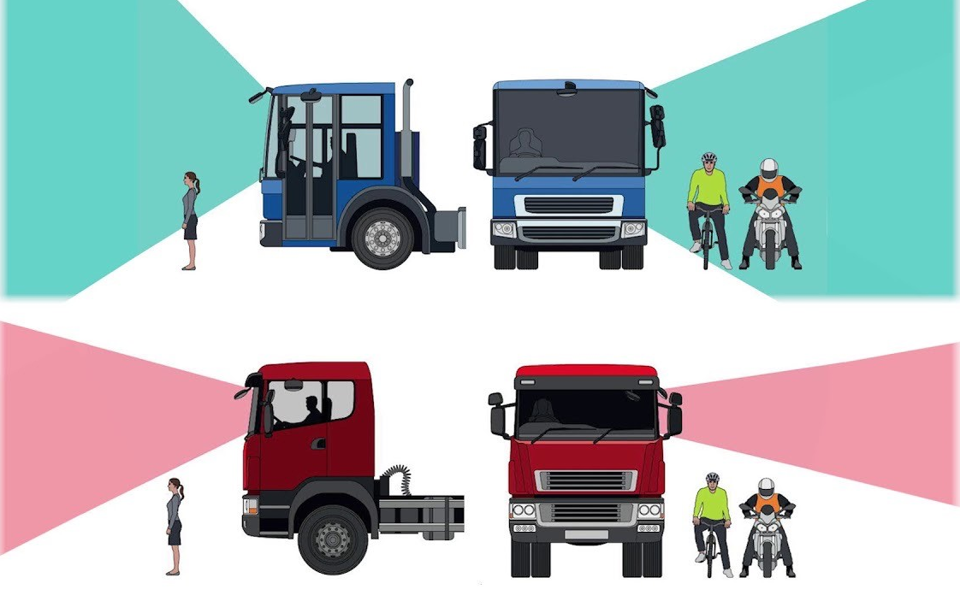Transport for London (TfL) has proposed a series of changes to the Direct Vision Standard (DVS) and HGV safety permit scheme.
The proposed changes are designed to improve the safety standards of HGVs operating in the capital, further reducing the risks to vulnerable road users such as people walking and cycling.
TfL’s HGV safety permit scheme, first introduced in 2019, requires all operators of HGVs weighing more than 12 tonnes to apply for a free permit to operate in London.
Data shows that fatal collisions involving HGVs where vision is cited as a contributing factor halved from 12 in 2018, the year before the scheme was introduced, to six in 2021.
A permit is granted if the vehicle meets the minimum DVS star rating, which is based on how much the driver can see directly through their cab windows.
Ratings range from zero stars (the lowest rating with poor direct vision) to five stars (the highest rating with excellent direct vision).
Vehicles that do not meet the minimum requirements, currently one star, must already have or fit the ‘Safe System’.
This is a series of vehicle safety measures, such as mirrors, sensors and cameras, which are designed to reduce the risks that HGVs present to people walking and cycling.
TfL is now asking people to have their say on recommendations to enhance the current Safe System, taking into account new and emerging technology or safety equipment that was not previously available.
TfL says that moving to a new Progressive Safe System is vital to its efforts to meet the Vision Zero goal of eliminating all deaths and serious injuries from London's transport network by 2041.
TfL estimates that these new safety requirements will be applied to around 165,000 vehicles, which is 90 per cent of the existing fleet operating in London.
Proposed changes to the Safe System include:
- Updating existing guidance on the use of mirrors and mirror-replacement Camera Monitoring Systems (CMS).
- The requirement for CMS fitted on vehicles to eliminate any remaining blind spots on the passenger side.
- Sensors ensuring full coverage down the passenger side of all vehicles to detect vulnerable road users. They must not activate in relation to roadside furniture or stationary vehicles.
- Moving Off Information Systems (MOIS) fitted to the front of a vehicle to prevent collisions at the frontal blind spot zone when a vehicle moves off from rest.
- Audio warnings fitted to all vehicles, including those with left hand drive to ensure all vehicles operating in London have the ability to warn of an intended manoeuvre.
Christina Calderato, TfL's director of transport strategy and policy, said: “It’s crucial that all vehicles using London’s roads have safety at the forefront of their design and our world-first Direct Vision Standard has helped to significantly improve lorry safety.
“We will continue to take every possible measure to eradicate deaths and serious injuries from our roads, which is why we are proposing to enhance the safe systems for HGVs.
“All feedback to our consultation is important to developing the best possible set of requirements and I'd encourage everyone affected to take part.”
Logistics UK is calling for further specification details to be released to ensure operators are able to fully engage and respond.
Chris Yarsley, Logistics UK’s senior policy manager for road freight regulation, said: “The consultation document currently provided by TfL states that the specification for various safety features, including sensors, will be made available once the period for responses closes.
“This detail is vital as operators cannot provide a full response without clarity on what additional features will be required. Industry wants to fully engage however, this requires full understanding and detail that currently, the consultation does not provide.”
Logistics UK says it is encouraged by the guidance that further safety features should be retrofittable to existing vehicles and not be cost prohibitive.
Operators engaged with the initial standards, incurring multiple costs to upgrading existing fleets. “It is now important that these upgrades, which were made in good faith, are not fully superseded,” continued Yarsley.
“Operators are facing increased costs due to rises to inflation, net zero transition costs and increased fuel prices. The logistics industry operates on tight profit margins and, like other sectors of the economy, is facing increased financial strain.
“Logistics UK is urging TfL to consider not just the cost of purchasing, but also the potential costs of the vehicles being out of service while fitting new systems.
“Logistics UK is also calling for TfL to consider the national shortfall of available technicians needed to make these upgrades, when considering timeframes for implementing the increased safety standard.”
The consultation is open until April 3 and can be accessed via the TfL website.























Login to comment
Comments
No comments have been made yet.